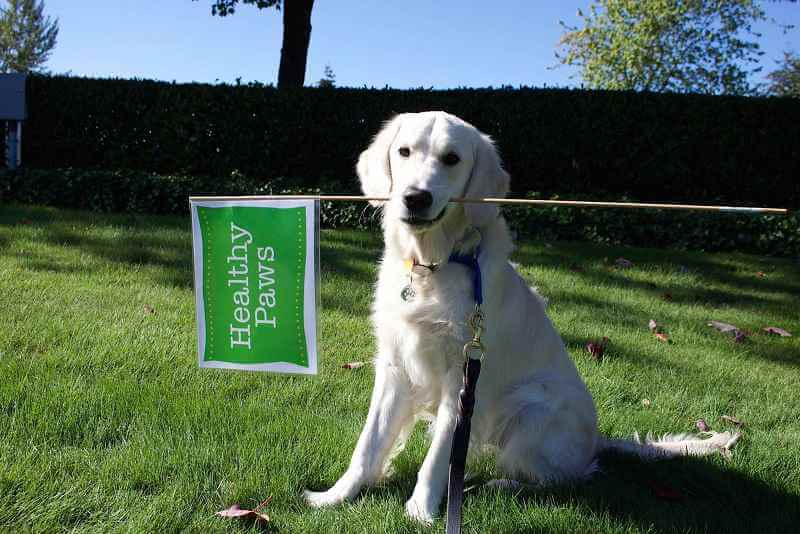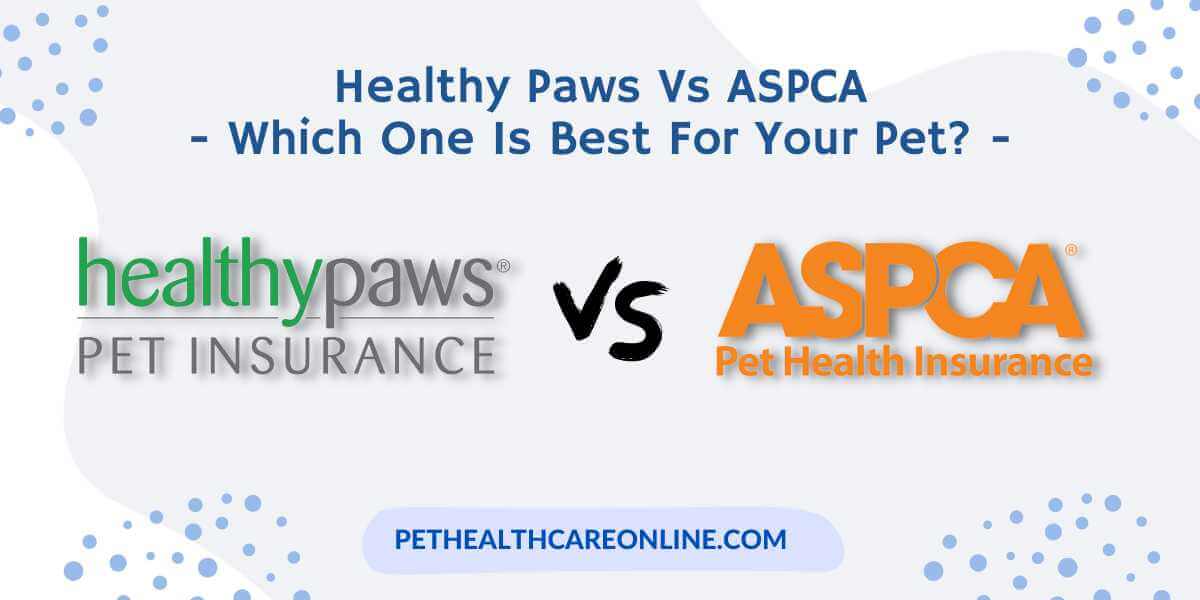Pet insurance helps pet owners pay for their pet’s medical care, so both the owners and the pets can enjoy a more fulfilled, worry-free life if anything terrible happens and vet bills start coming in.
Many pet insurance providers offer different coverage plans, so pet owners should consider many aspects when opting for pet insurance. There are pet insurance providers that will cover most medical care and prescription meds. Still, some companies have not included specific medical procedures and care in their coverage plans.
ASPCA allows you to visit any veterinary clinic in the United States.
Luckily for pet parents, two pet insurance companies have gained the trust of many, and we are about to break down the details of Health Paws and ASPCA’s pet insurance.
Stay with us and read the most comprehensive comparison between Healthy Paws and ASPCA, as they are the most prominent pet insurance companies on the market.
Healthy Paws: Overview
Launched in 2009, Healthy Paws pet insurance offers pet parents the necessary help to deal with unexpected accidents and illnesses that their pets might face.
Healthy Paws’ mission is to afford pet owners complete pet insurance coverage at reasonable rates, and it only provides one plan that includes unlimited coverage caps.
It’s with good reason that Healthy Paws has been a fan favorite for years, given the benefits it delivers to both pets and their owners
Pros
- 30-day money-back guarantee;
- Covers alternative therapy;
- Fast claim processing;
- Direct payment under certain conditions.
Cons
- Limited coverage for older pets;
- It doesn’t cover prescription food.
Healthy Paws offers unlimited lifetime and annual coverage caps. Pet owners love this particular aspect of pet insurance because it takes some of the financial burdens off their shoulders when the vet bills come knocking.
The monthly rates at Healthy Paws are also cheaper than the monthly premiums by other competitors that offer unlimited coverage caps.

ASPCA: Overview
ASPCA, which stands for the American Society for the Prevention of Cruelty to Animals, is a great pet health insurance provider in the United States. This company believes that all animals have the right to get humane treatment and helps in preventing animal cruelty.
ASPCA is among the largest animal protection societies worldwide, with more than 1 million members. Although this particular pet insurance company is a household name in the pet insurance industry, it is not without its flaws.
Pros
- Multi-pet discount;
- Customizable plans;
- No upper age limit for pet enrollment;
- Covers illness exam fees.
Cons
- The website is not quite user-friendly;
- Monthly payments have a transaction fee.
ASPCA offers two insurance plans for pets: the Accidents and Illnesses plan and the Accident-Only plan for dogs and cats. In certain states, horseback riding fans can purchase insurance for their horses. The Premium rates at ASPCA are incredibly affordable; plus, ASPCA is quite flexible with its offerings.

Healthy Paws vs ASPCA: Coverage and Limits
We’ll begin the Healthy Paws vs. ASPCA showdown with the coverage both pet insurance companies offer.
Healthy Paws and ASPCA deliver similar coverage options at affordable costs. Still, they are also different, as Healthy Paws offers only one coverage while the ASPCA provides its clients with 3 types of pet insurance.
Both Healthy Paws and ASPCA ask for a complete head-to-foot examination for all dogs and cats that qualify for their comprehensive coverage, but let’s see what each offers pet parents.
What Does Healthy Paws Cover?
Healthy Paws’ pet insurance coverage for dogs and cats is quite extensive, and it revolves around many medical issues and accidents, like:
Illnesses like skin conditions, allergies, ear infections, eye problems, heatstroke, stomach problems, dehydration in dogs, cancer, stomach problems, urinary tract infections, and abnormal growths in cats;
- Accidents such as foreign body obstruction, poisoning, and animal bites;
- Congenital and hereditary conditions, including nervous system disease, heart disease, liver disease, intervertebral disc disease, elbow dysplasia, and cherry eye;
- Chronic conditions like kidney disease, asthma, glaucoma, diabetes, and arthritis;
- Cancer treatment expenses for pet cancer diagnostics, ultrasounds, surgery, hospitalization, radiation therapy, and chemotherapy;
- Diagnostic procedures, such as ultrasounds, x-rays, and bloodwork;
- Emergency veterinary care, surgery, and hospitalization;
- Prescription medication;
- Specialty care, including orthopedic specialists, internal medicine specialists, and ophthalmologists;
- and Holistic/ alternative care such as chiropractic, hydrotherapy, and acupuncture.
What Does ASPCA Cover?
ASPCA offers its clients extensive insurance plans that include coverage for lab tests, diagnostics, and treatment for:
- Accidents including broken bones, torn ligaments, poisoning, and bite wounds;
- Illnesses such as allergies, infections of the urinary tract, cancer, and arthritis;
- Vet exam fee for consultations and medical exams in case of accidental injuries or illnesses;
- Congenital and hereditary conditions like hip dysplasia, eye diseases, intervertebral disc, and heart diseases;
- Chronic conditions including arthritis, diabetes, and cancer;
- Cancer treatment, including radiation therapy and chemotherapy;
- Behavioral modification therapy;
- Alternative therapies such as hydrotherapy, naturopathy, homeopathy, acupuncture, and chiropractic;
- Dental coverage for tooth extractions, unerupted teeth problems, deciduous teeth, enamel, cysts, periodontal disease, and illness-related cleaning;
- Prescription food and medications;
- Emergency vet care;
- Other therapies like stem cell therapy, vet-administered euthanasia, microchip implantation, laser therapy, and cremation or burial expenses.
ASPCA delivers a wellness add-on to the insurance plan that includes dental cleanings, vaccinations, and flea medications, among other issues.
After looking into the details of both Healthy Paws and ASPCA’s pet insurance, we have to say that ASPCA takes the crown home because it offers an option to add wellness coverage and covers more treatment expenses than Healthy Paws.
Healthy Paws vs ASPCA: Waiting Period
When it comes to the waiting period, pretty much every pet insurance company will deliver within the same timeframe.
The waiting period at Healthy Paws is 15 days, which is only 1 day longer than what the ASPCA will ask pet parents to wait for before insurance kicks in. Healthy Paws has an extended waiting period for hip dysplasia for dogs that are younger than 6.
Unlike Healthy Paws, ASPCA’s pet insurance doesn’t come with an extended waiting period for particular illnesses like a cruciate ligament illness. Pet owners whose pet breed has a predisposition for this problem should know that pet insurance companies might take more than 14 days to grant the insurance, while the ASPCA won’t.
So, considering the waiting period asked by Healthy Paws and ASPCA, we deem ASPCA the winner! The shorter overall waiting period and the short waiting period for dogs with certain medical predispositions made ASPCA take the spotlight.
Healthy Paws vs ASPCA: Claim Filing
When it comes down to filing a claim, both Healthy Paws and ASPCA offer their clients the option to do it digitally.
Healthy Paws policyholders don’t need to complete any claim forms – they only need to take a photo of their vet’s bill and upload it via the mobile app or fax or email it.
ASPCA is also following the latest trends, so their customers can file a claim using the up-to-date ASPCA app or by visiting its website. ASPAC’s pet insurance policyholders can also submit the claim electronically, email it, or print it out and send it via fax.
Besides submitting a copy of the vet bill for Healthy Paws’ or ASPCA’s pet insurance claim, customers must share their pet checkups required data and results.
By digitally submitting the claim, policyholders of both Healthy Paws and ASPCA’s pet insurance can track their claim status through the mobile app or the official website of the pet insurance company.
Healthy Paws processes the claims within 2 days, but the ASPCA takes a bit more time, which is 9 days.
So, since Healthy Paws will process a claim in just two days, it deserves to be crowned the winner for claim filing.
Healthy Paws vs ASPCA: Pricing Plans
The price for pet insurance is based on the pet’s breed, gender, age, and location. Healthy Paws’ prices aren’t fixed, and they are different for dogs and cats.
The costs for dogs start at $20.33 for a 1-year-old dog up to $155.74 for 12-year-old dogs. For cats, the price ranges from $8.00 for 1-year-old cats up to $61.31 for 12-year-old cats.
ASPCA’s pet insurance comes with customizable options that may affect the insurance coverage price. For example, the attractive Accident-Only pet insurance plan costs between $13.9 and $33.20 for dogs and around $9.87 and $22.26 for cats.
Instead of selecting the annual payment option, policymakers at ASPCA need to pay a $2 transaction fee a month if they choose to pay monthly or for a 6-month period.
Healthy Paws vs ASPCA: Deductibles and Reimbursement
Pet parents should be careful when choosing pet insurance because they should be familiar with the reimbursement methods and the deductibles for the particular annual coverage limit plan.
As soon as the policyholders reach their coverage limit, they should pay for each of the health-related expenses for their pet during the rest of the year.
Healthy Paws and ASPCA are different in the annual limit options they offer.
Healthy Paws’ Deductibles and Reimbursement
Healthy Paws’ annual deductibles and reimbursement depend on the pet’s age:
For pets under 6 years old:
- Annual deductibles: $500 or $250;
- Reimbursement rates: 80% or 70%;
- Annual coverage limits: Unlimited.
6-year-old cats and dogs condition the following:
- Reimbursement: 70%;
- Deductible: $500
7-year-old cats and dogs
- Reimbursement: 70% reimbursement;
- Deductible: $750 deductible
8-year or older cats and dogs:
- Reimbursement: 50% reimbursement;
- Annual deductible: $1,000
ASPCA’s Deductibles and Reimbursement
Policyholders of ASPCA’s pet insurance have more options for customizing their ASPCA pet’s policy pricing and coverage:
- Annual deductibles: $500, $250 or $100;
- Reimbursement rates: 90%, 80% or 70%;
- Annual coverage limits: $10,000, $7,000, $5,000, $4,000 or $3,000
ASPCA offers wellness and routine add-ons and a 24h veterinary hotline to give professional advice to pet owners concerned about any medical problem with their pet.
However, Healthy Paws doesn’t provide any of these benefits.
So, given the pricing plans, the deductibles, and the reimbursement rates, we have to give it up for ASPCA.
The Verdict: Which One Is the Best?
It is undeniable that both Healthy Paws and ASPCA pet insurance companies offer extensive plans and wholesome coverage for dogs and cats; however, considering the silver lines in both, we have to crown ASPCA as the winner.
ASPCA covers several medical procedures and treatments that Healthy Paws doesn’t, such as microchipping, as a pet insurance company. ASPCA’s pet insurance waiting period is shorter, and it has an Accident-Only plan which is less expensive than the standard Healthy Paws plan.
Although ASPCA policyholders need to pay a $2 transaction fee for the monthly option, they can always go with an annual payment option and avoid these expenses.
With an excellent reputation and millions of members, ASPCA is the best choice for pet insurance today.



